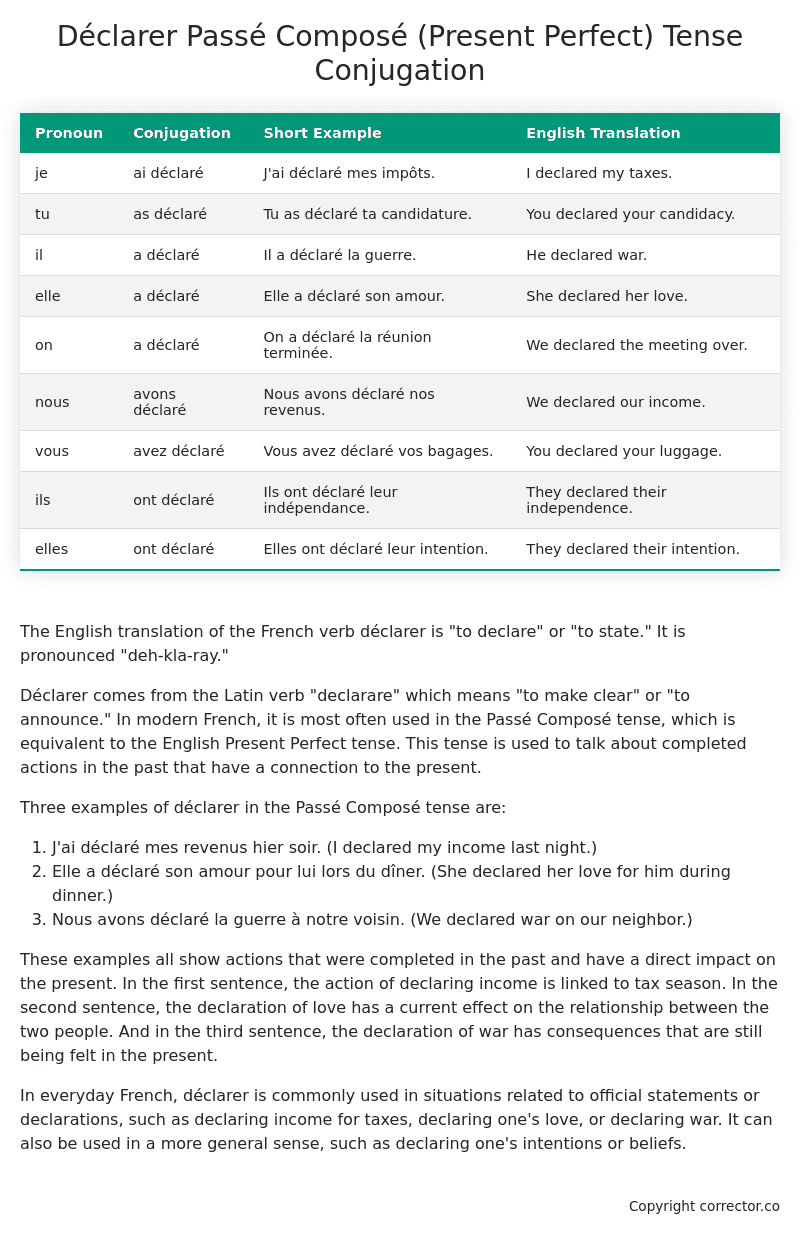Passé Composé (Present Perfect) Tense Conjugation of the French Verb déclarer
Introduction to the verb déclarer
The English translation of the French verb déclarer is “to declare” or “to state.” It is pronounced “deh-kla-ray.”
Déclarer comes from the Latin verb “declarare” which means “to make clear” or “to announce.” In modern French, it is most often used in the Passé Composé tense, which is equivalent to the English Present Perfect tense. This tense is used to talk about completed actions in the past that have a connection to the present.
Three examples of déclarer in the Passé Composé tense are:
- J’ai déclaré mes revenus hier soir. (I declared my income last night.)
- Elle a déclaré son amour pour lui lors du dîner. (She declared her love for him during dinner.)
- Nous avons déclaré la guerre à notre voisin. (We declared war on our neighbor.)
These examples all show actions that were completed in the past and have a direct impact on the present. In the first sentence, the action of declaring income is linked to tax season. In the second sentence, the declaration of love has a current effect on the relationship between the two people. And in the third sentence, the declaration of war has consequences that are still being felt in the present.
In everyday French, déclarer is commonly used in situations related to official statements or declarations, such as declaring income for taxes, declaring one’s love, or declaring war. It can also be used in a more general sense, such as declaring one’s intentions or beliefs.
Table of the Passé Composé (Present Perfect) Tense Conjugation of déclarer
| Pronoun | Conjugation | Short Example | English Translation |
|---|---|---|---|
| je | ai déclaré | J’ai déclaré mes impôts. | I declared my taxes. |
| tu | as déclaré | Tu as déclaré ta candidature. | You declared your candidacy. |
| il | a déclaré | Il a déclaré la guerre. | He declared war. |
| elle | a déclaré | Elle a déclaré son amour. | She declared her love. |
| on | a déclaré | On a déclaré la réunion terminée. | We declared the meeting over. |
| nous | avons déclaré | Nous avons déclaré nos revenus. | We declared our income. |
| vous | avez déclaré | Vous avez déclaré vos bagages. | You declared your luggage. |
| ils | ont déclaré | Ils ont déclaré leur indépendance. | They declared their independence. |
| elles | ont déclaré | Elles ont déclaré leur intention. | They declared their intention. |
Other Conjugations for Déclarer.
Le Present (Present Tense) Conjugation of the French Verb déclarer
Imparfait (Imperfect) Tense Conjugation of the French Verb déclarer
Passé Simple (Simple Past) Tense Conjugation of the French Verb déclarer
Passé Composé (Present Perfect) Tense Conjugation of the French Verb déclarer (this article)
Futur Simple (Simple Future) Tense Conjugation of the French Verb déclarer
Futur Proche (Near Future) Tense Conjugation of the French Verb déclarer
Plus-que-parfait (Pluperfect) Tense Conjugation of the French Verb déclarer
Passé Antérieur (Past Anterior) Tense Conjugation of the French Verb déclarer
Futur Antérieur (Future Anterior) Tense Conjugation of the French Verb déclarer
Subjonctif Présent (Subjunctive Present) Tense Conjugation of the French Verb déclarer
Subjonctif Passé (Subjunctive Past) Tense Conjugation of the French Verb déclarer
Subjonctif Imparfait (Subjunctive Imperfect) Tense Conjugation of the French Verb déclarer
Subjonctif Plus-que-parfait (Subjunctive Pluperfect) Tense Conjugation of the French Verb déclarer
Conditionnel Présent (Conditional Present) Tense Conjugation of the French Verb déclarer
Conditionnel Passé (Conditional Past) Tense Conjugation of the French Verb déclarer
L’impératif Présent (Imperative Present) Tense Conjugation of the French Verb déclarer
L’infinitif Présent (Infinitive Present) Tense Conjugation of the French Verb déclarer
Struggling with French verbs or the language in general? Why not use our free French Grammar Checker – no registration required!
Get a FREE Download Study Sheet of this Conjugation 🔥
Simply right click the image below, click “save image” and get your free reference for the déclarer present perfect tense conjugation!

Déclarer – About the French Passé Composé (Present Perfect) Tense
Formation of the Passé Composé
Set the auxiliary verb with either
Conjugate the auxiliary verb
Add the past participle
Common everyday usage patterns
Narrating Past Events
Sequential Actions
Describing Completed Actions
Interactions with other tenses
Imperfect Tense
Conditional and Future Tenses
Summary
I hope you enjoyed this article on the verb déclarer. Still in a learning mood? Check out another TOTALLY random French verb conjugation!


